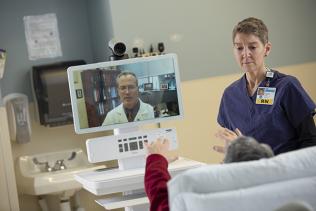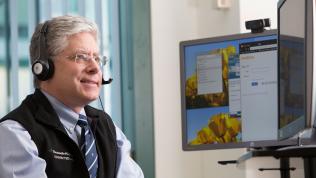Watch this video to learn about our TeleNeurology.
Minutes matter during a stroke. Our TeleNeurology can be there to improve outcomes for these patients and for many others with urgent neurologic issues.
TeleNeurology, a service of our Connected Care, enables faster access to patients having neurological emergencies. The TeleNeurology Program provides 24/7 consultations by a board-certified neurologist for patients 18 years and older.
Telestroke networks should be deployed wherever a lack of readily available stroke expertise prevents patients in a given community from accessing a primary stroke center (or center of equivalent capability) within a reasonable distance or travel time to permit eligibility for intravenous thrombolytic therapy.
ASA Recommendations for the implementation of telemedicine within stroke systems of care, 2013
Patients are evaluated, managed, and treated in real-time collaboration with the local attending physicians or associate providers. The American Stroke Association (ASA) has recommended that a stroke specialist, using high-quality video conferencing, provide a medical opinion in favor of or against the use of intravenous tPA in patients with suspected acute ischemic stroke when on-site stroke expertise is not immediately available:
In keeping with ASA recommendations, the TeleNeurology program offers prompt, high-quality, real-time audio/visual patient evaluation and assessment, within 30 minutes for time-sensitive cases and within 120 minutes for non-time-sensitive conditions.
Prior to implementing TeleNeurology services, I was faced with time-consuming neuro assessments followed by complex and risky decisions without access to a Neurologist. With the input of a TeleNeurologist, I can focus on maintaining the flow and care of my other patients, while receiving timely and important neurological recommendations.
Dr. Adam R. Cohen, ED Medical Director Southern Vermont Medical Center
Time-sensitive conditions
- Acute stroke with TLKW less than 4.5 hours
- Acute stroke with TLKW between 4.5 and 24 hours
- TIA with TLKW less than 4.5 hours
- TIA with TLKW between 4.5 and 24 hours
- Intracranial hemorrhage
- Status epilepticus
- Other rapidly progressive neurologic condition (e.g., myasthenic crisis)
Non-time-sensitive conditions
- Acute stroke with TLKW greater than 24 hours
- Mental status change not via toxic, metabolic, or infectious cause
- TIA with TLKW greater than 24 hours
- MS exacerbation
- Seizure
- Syncope
- Bell’s Palsy
- Migraine
- Other neurologic conditions
In addition to providing clinical care for patients requiring emergency neurological care, the TeleNeurology team provides the following services:
- Support and coordination for credentialing/privileging.
- Program Implementation — An experienced and multi-disciplinary team comprising a project manager, clinicians, and technical professionals delivers a wide range of services throughout the planning and implementation process. A collaborative project plan, developed after contract signing, specifies responsibilities and timing for each implementation task.
- Program Training — Clinical training is delivered to your staff to assure confidence in the Emergency TeleNeurology service and the partnership between us and your hospital.
- IT support, including assistance with network configuration and equipment set-up and ongoing 24/7 support for technical issues.
- Educational offerings for hospital staff.
Advantages of the TeleNeurology Program
Please expand the following topic areas to learn more about the advantages of partnering with the TeleNeurology Program.
Financial and Quality Impact
TeleNeurology contributes positively to finances, market position, and staffing management through:
Improved financial performance
- Avoidance of transfers
- Decreased length of stay and ancillary costs
- Decreased need for physician/PA/NP backup call
- Reduced staffing costs, decreased need for locums tenens
- Low-cost coverage for hospitals with limited or no neurologist access
Improved physician life balance, retention, and recruitment
Increased capacity resulting from greater throughput
Improved quality measures and outcomes
- Our physicians are patient- and hospital-focused while adhering to strict federal, state, and hospital-specific requirements.
- Improved timeliness in door to t-PA for eligible patients
- Improved timeliness in mean door-in, door-out time (time to transfer)
- Emergency TeleNeurology physicians are licensed and credentialed in all states/hospitals where services are provided.
Competitive market advantage
Educational Resources
American Stroke Association
According to the AMA, "Telestroke is one of the most successful applications of telemedicine, bridging disparities in acute stroke care by bringing experienced stroke experts to hospitals that often lack expertise in treating acute ischemic stroke (AIS) patients."
National Stroke Association
The National Stroke Association (NSA) is able to provide you with the information and tools you need to prevent and treat stroke in your patients, no matter where you work along the continuum of stroke care.
Commonly Asked Questions
Do your providers cover all consults?
In addition to neurologist coverage of the TeleNeurology service, we have partnered with Access TeleCare (ATC), a national leader with more than 10 years of experience, currently providing Emergency TeleNeurology Services to more than 350 hospitals across the United States. ATC annually consults on more emergency neurology patient cases than any traditional bricks and mortar medical center in the country.
When can we request a TeleNeuro consult? Overnight? Holidays?
Yes, the service is 24/7/365 for emergency consults.
How do I connect to the cart?
Our Telehealth Technology Team will secure all the connectivity to the cart. When it's time for the consult, the physician will call in and connect automatically. If there are issues with the cart, the technology team is on call 24/7 to triage the issue.
Will I receive a copy of the consult note? What is the turnaround time?
Yes, a consult note will be faxed to the number provided at intake within a 15-60 minute turnaround time. Please note: the service provider will call the attending on-site directly after to discuss recommendations, etc.
How do the patient's images get to the neurologist doing the consult?
The technology team has set up an access point for the images to be sent using DICOM Grid. The images will be pushed from staff on site. The Transfer Center will then redirect the images to the appropriate location.
What is the difference between "Emergency" and "General" service?
- Emergency service is provided 24/7 by a board-certified neurologist for patients who present with emergent conditions that should not wait for a regularly scheduled consult.
- General service refers to scheduled consults for all non-emergent neurologic conditions provided by board-certified neurologists.
Contact information
For more information about our TeleNeurology Program, please contact:
Katelyn Darling
Director of Operations, Connected Care
katelyn.a.darling@hitchcock.org
Phone: 603-650-1317
Fax: 603-727-7462
Brittany Sleeper, MSHA
Manager, Inpatient & Outpatient TeleSpecialty
brittany.n.sleeper@hitchcock.org
Phone: 603-650-1349

